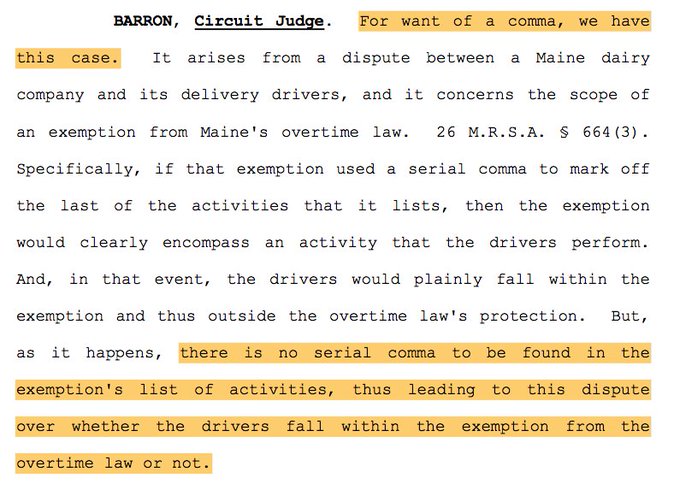Elena Cresci in The Guardian
Never let it be said that punctuation doesn’t matter.
In Maine, the much-disputed Oxford comma has helped a group of dairy drivers in a dispute with a company about overtime pay.
The Oxford comma is used before the words “and” or “or” in a list of three or more things. Also known as the serial comma, its aficionados say it clarifies sentences in which things are listed.
As Grammarly notes, the sentences “I love my parents, Lady Gaga and Humpty Dumpty” and “I love my parents, Lady Gaga, and Humpty Dumpty” are a little different. Without a comma, it looks like the parents in question are, in fact, Lady Gaga and Humpty Dumpty.
on the one hand I love the #oxfordcomma, on the other hand these sentences truly are SO GOOD
In a judgment that will delight Oxford comma enthusiasts everywhere, a US court of appeals sided with delivery drivers for Oakhurst Dairy because the lack of a comma made part of Maine’s overtime laws too ambiguous.
The state’s law says the following activities do not count for overtime pay:
The canning, processing, preserving, freezing, drying, marketing, storing, packing for shipment or distribution of:(1) Agricultural produce;
(2) Meat and fish products; and
(3) Perishable foods.
The drivers argued, due to a lack of a comma between “packing for shipment” and “or distribution”, the law refers to the single activity of “packing”, not to “packing” and “distribution” as two separate activities. As the drivers distribute – but do not pack – the goods, this would make them eligible for overtime pay.
Previously, a district court had ruled in the dairy company’s favour, who argued that the legislation “unambiguously” identified the two as separate activities exempt from overtime pay. But the appeals judge sided with the drivers.
We conclude that the exemption’s scope is actually not so clear in this regard. And because, under Maine law, ambiguities in the state’s wage and hour laws must be construed liberally in order to accomplish their remedial purpose, we adopt the drivers’ narrower reading of the exemption.
AP style fans, we know you'll appreciate an #APStyleHaiku about Oxford commas. You can write, count and share, too. twitter.com/nathanfrontier…
The Oxford comma ignites considerable passion among its proponents and opponents. In 2011, when it was wrongly reported that the Oxford comma was being dropped by the University of Oxford style guide, there was uproar.
“Who gives a fuck about an Oxford comma?” opens one Vampire Weekend song.
The Guardian style guide has the following to say about Oxford commas:
a comma before the final “and” in lists: straightforward ones (he ate ham, eggs and chips) do not need one, but sometimes it can help the reader (he ate cereal, kippers, bacon, eggs, toast and marmalade, and tea).Sometimes it is essential: compareI dedicate this book to my parents, Martin Amis, and JK RowlingwithI dedicate this book to my parents, Martin Amis and JK Rowling





No comments:
Post a Comment